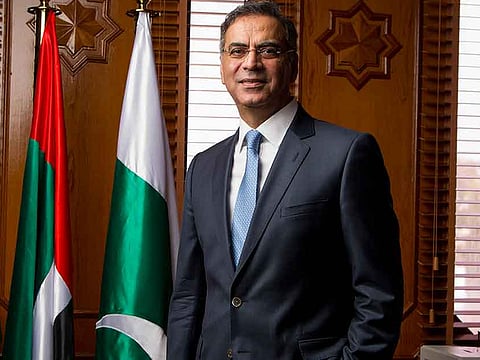Pakistan: Building on strong ties with the UAE
Nation's Ambassador to the UAE believes the relationship between the two countries remains unique

Pakistan and the UAE enjoy strong bilateral ties and a relationship that goes back to the very early days of the Emirates’ conception. In fact, Pakistan was among the first in the world to officially recognise the UAE after the British announced the end of their protectorate. Moazzam Ahmad Khan, Pakistan Ambassador to the UAE, believes that the enduring relationship affords the two nations a special bond. “The relationship is deeprooted in terms of economic cooperation, common cultural and religious heritage, affection and trust,” he says. “It’s a special, longstanding relationship.”
Serving the people
The Pakistani population is second only to Indians as the largest expat population residing in the UAE. More than 1.2 million Pakistanis are living in the UAE and as their ambassador his job is far more complex than just nurturing relationships.
“One of the biggest challenges that we’re working on is how to better serve the interests of our community,” says Khan. “We offer a lot of consular services that we extend to the community, including the issuance of passports, ID cards and attestation of legal documents, among others.”
His obligations also extend to Pakistanis who struggle financially. “We have people who are destitute for various reasons,” he says. “Sometimes they are
facing problems regarding payment of fines or other labour-related issues. Around 80 per cent of the community we see fall under the labourer category.”
The financial challenges of many Pakistani expats also affect education. The UAE’s high school fees mean workers on lower wages struggle to meet the costs and this is something the ambassador recognises and takes very seriously. “We try to support education of our children. Currently we have seven community schools, which provide affordable, Pakistani syllabus education to our expatriate population.”
The subsidies have reduced school fees to between Dh250 and Dh350 and between 25 and 35 per cent of pupils are exempted from any fees. There are around 10,000 children registered in community schools but Khan is adamant that there is still more to be done. “There are still many families who we feel need help but we have limitations in terms of our resources,” he says.
Assistance to Pakistani families also applies to those living in Pakistan itself. The UAE’s Pakistan Assistance Programme, which is funded by the Emirates, aims to alleviate poverty and develop infrastructure in the country. Khan refers to the 100-bed Shaikh Khalifa Hospital in the northern area, the Shaikha Fatima Hospital and the polio eradication programme as examples of the commendable work being carried out by the programme. In infrastructure, the UAE also recently helped Pakistan construct a 75km road between North and South Waziristan.
Embracing the future with CPEC
The most significant economic development plan launched in Pakistan in decades is its bilateral agreement with China. Part of the One Road, One Belt
initiative, the China–Pakistan Economic Corridor (CPEC) will see Pakistan benefit from more than $50 billion (Dh183 billion) in investment. Khan remains optimistic that not only will his home country benefit but also the improved economic conditions will positively affect the region as a whole, including
the UAE. “All of Central Asia and the Middle East can benefit from CPEC because transportation costs and the time it takes to trade goods will reduce
enormously,” he says.
“We would like our friends, such as the UAE, to benefit from the economic opportunities that CPEC will offer.” In fact, he believes the UAE is in a unique position to profit from the project. “I feel the UAE is in a pivotal situation to benefit from this initiative. I was reading that 60 per cent of global trade is routed through this region and the UAE has a very developed infrastructure; its ports are some of the best in the whole region.”
Managing trade balancing act
One of Khan’s main responsibilities in developing trade ties is introducing key Pakistanis to relevant figures here in the UAE. “The exchange of visitors has always been a part of the relationship, which is multifaceted and covers the military, security, economic, culture, tourism and business spheres,” he says.
Pakistan has almost $7 billion of bilateral trade with the UAE but Khan would like to see more Pakistani goods exported to the UAE, as currently there is a $6.2 billion surplus in favour of the UAE. “The UAE is a major trade partner but the surplus is hugely in favour of the Emirates. With the help of the UAE government, we are trying to narrow this gap.”
The ambassador is working to encourage more exports from Pakistan. “My work is to promote the UAE as an import market and introduce UAE importers to Pakistani exporters. We are also trying to promote export of organic fruit and vegetable from Pakistan to the UAE. Currently we are only exporting traditional products, such as textiles and rice but we feel there is huge potential in terms of exports.”
70th anniversary celebrations
In celebration of Pakistan’s 70th anniversary of independence, the embassy is planning a number of activities, running up until December. Flags will be
hoisted, musical galas have been scheduled and a photography exhibition is being prepared. A special event has also been planned to honour individuals who have made significant contributions to both Pakistani community and the UAE itself.
According to Khan, the event will be for “the people who really contributed to the betterment of communities, for the uplift of Pakistanis and to the development of the relationship between Pakistan and the UAE. Pakistan will also be recognising some of the UAE nationals who have done exceptionally well in terms of bringing the two communities together and improving the relationship.”



